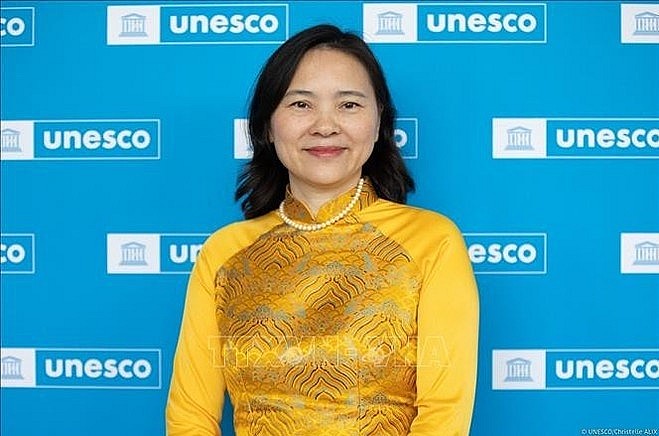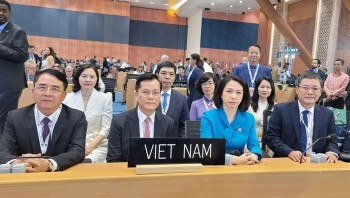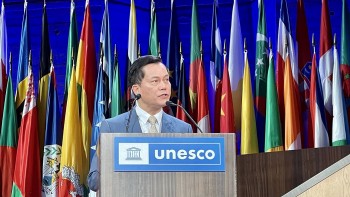Vietnam Prepares for a Dynamic Year at UNESCO in 2025
| UNESCO Assistant Director-General Highlights Youth as Catalyst for Social Change | |
| Hanoi Announces Plan to Celebrate 70 years of Education Sector |
The diplomat said that 2024 continued to be a successful year for Vietnam’s cultural diplomacy, with contributions from Vietnam’s activities at UNESCO and the cooperation between Vietnam and UNESCO.
She emphasised that 2024 was a year for continued implementation of the goals outlined by the 13th National Party Congress, particularly the promotion of cultural diplomacy to strengthen the country’s image and enhance national power, and the implementation of the 2030 Cultural Diplomacy Strategy and the results of the National Cultural Conference in 2021 and the 32nd Diplomatic Conference in 2023.
The biggest milestone of 2024 was the historic visit of General Secretary of the Communist Party and State President of Vietnam To Lam to UNESCO’s headquarters on October 7. This visit marked the first time a Vietnamese leader had visited UNESCO in this capacity since the country’s membership in the organisation in 1976. During the visit, the leader met UNESCO Director-General Audrey Azoulay, affirming Vietnam’s commitment to deepening cooperation with UNESCO and discussing future cooperation directions.
 |
| Ambassador Nguyen Thi Van Anh, Vietnam’s Permanent Representative to UNESCO (Photo: VNA) |
In 2024, Vietnam also celebrated receiving six new UNESCO titles, the highest number in recent years, bringing the total to 71. These included the recognition of the Via Ba Chua Xu Nui Sam Festival as an intangible cultural heritage of humanity, the recommendation of Lang Son Geopark for Global Geopark status, and the inscription of “The Nine Bronze Drum Castings at the Imperial Palace in Hue” as a World Documentary Heritage, she said. Ambassador Anh noted that the addition of these UNESCO designations is a testament to the global recognition of Vietnam’s heritage and culture. It also boosts national soft power and promotes sustainable development in local communities while demonstrating Vietnam’s commitment to the global effort to preserve world heritage.
Relevant agencies of Vietnam and Hanoi authorities have closely collaborated with and received support from the World Heritage Centre and the International Council on Monuments and Sites (ICOMOS), achieving a breakthrough in the implementation of the conservation, restoration, and valorisation project for the Thang Long Imperial Citadel, paving the way for the restoration of the “Ngu dao” (Emperor's road) and the Kinh Thien Palace, while ensuring compliance with the UNESCO 1972 World Heritage Convention. UNESCO and ICOMOS have repeatedly emphasised that this partnership serves as a model of cooperation between a nation and UNESCO/ICOMOS in heritage preservation and enhancement, and they have expressed hope that Vietnam will share this valuable experience with other countries.
Besides, UNESCO, in collaboration with Vietnam, has honoured and celebrated the 300th anniversary of the birth of Vietnam’s talented medic Hai Thuong Lan Ong Le Huu Trac, showing UNESCO's acknowledgment of the significant contributions of the figure in the fields of education, healthcare, culture, and society. This also highlights the global dissemination of the talents and intellect of the Vietnamese people on the international stage.
According to the ambassador, 2024 also witnessed the strengthening and enhancement of Vietnam's role and position at UNESCO. She cited a number of position that Vietnam has hold in this organisation, including the Vice President of the 10th Session of the UNESCO Convention on the Protection and Promotion of the Diversity of Cultural Expressions, a member of the UNESCO Executive Board (2021-2025), a member of the World Heritage Committee (2023-2027), Vice President (12/2023-12/2024) and member (2021-2026) of the Intergovernmental Committee of the 2003 Convention for the Safeguarding of the Intangible Cultural Heritage; Vice President (February 2023-February 2024) and member of the Intergovernmental Committee of the 2005 Convention for the Protection and Promotion of the Diversity of Cultural Expressions (2021-2025).
In these positions, Vietnam has proactively, actively, and responsibly contributed to advancing UNESCO's goals of enhancing international cooperation in areas that are crucial to human life, such as education, science, culture, information, and communication, while also promoting our own interests and concerns, she said, emphasising that Vietnam’s approach has been positive, encouraging dialogue, cooperation, and consensus, seeking appropriate solutions to common concerns, a strategy that has been highly appreciated by UNESCO leadership and member states.
Outlining the key tasks ahead for Vietnam in 2025, the diplomat highlighted that this year marks the final phase of implementing the cultural diplomacy agenda set by the 13th National Party Congress, heading to the 14th National Party Congress and the continued implementation of the Party Central Committee’s Secretariat’s directive to strengthen multilateral diplomacy.
For UNESCO, 2025 will be a pivotal year with the adoption of the Programme and Budget for 2026-2029 and the election of a new Director-General for the 2025-2029 term. It also marks the end of the current Memorandum of Cooperation between Vietnam and UNESCO (2022-2025).
In this context, Vietnam’s programmes and cooperation with UNESCO in 2025 will be “extensive and vibrant,” she stated.
The year 2025 will also see numerous high-level exchanges between Vietnam and UNESCO leaders, aimed at enhancing existing cooperation and setting future priorities.
Cooperation activities with UNESCO will be enhanced to support the country’s sustainable development and promote Vietnam’s image internationally. Vietnam will continue to work closely with UNESCO and ICOMOS on projects such as the restoration of the Thang Long Imperial Citadel and the “Ngu dao”.
Vietnam will collaborate with UNESCO to develop a Memorandum of Cooperation for the 2026-2030 period, the ambassador said.
Vietnam will also take a more active role in key UNESCO bodies, including the General Assembly, the Executive Board, and the World Heritage Committee, to support UNESCO’s mission and goals. This includes participating in significant upcoming events, such as the 43rd General Conference of UNESCO, the 47th World Heritage Committee session, and the Mondiacult World Conference on Cultural Policies and Sustainable Development.
Ambassador Anh expressed her confidence that 2025 would build on Vietnam’s successes in cultural diplomacy, alongside political and economic diplomacy, contributing to the country's new era of growth and international prominence.
 | Vietnam Joins Global Efforts to Conserve World Heritage Values The 46th session of the World Heritage Committee of UNESCO commenced at the Bharat Mandapam - Convention Center in New Delhi, India, on the morning ... |
 | How Vietnam's UNESCO Sites Enhance Cultural Tourism With more than 40,000 relics, many of which are recognized by UNESCO, Vietnam is considered a country with potential for developing cultural tourism. |
Recommended
 World
World
‘We stand with India’: Japan, UAE back New Delhi over its global outreach against terror
 World
World
'Action Was Entirely Justifiable': Former US NSA John Bolton Backs India's Right After Pahalgam Attack
 World
World
US, China Conclude Trade Talks with Positive Outcome
 World
World
Nifty, Sensex jumped more than 2% in opening as India-Pakistan tensions ease
Popular article
 World
World
Easing of US-China Tariffs: Markets React Positively, Experts Remain Cautious
 World
World
India strikes back at terrorists with Operation Sindoor
 World
World
India sending Holy Relics of Lord Buddha to Vietnam a special gesture, has generated tremendous spiritual faith: Kiren Rijiju
 World
World



